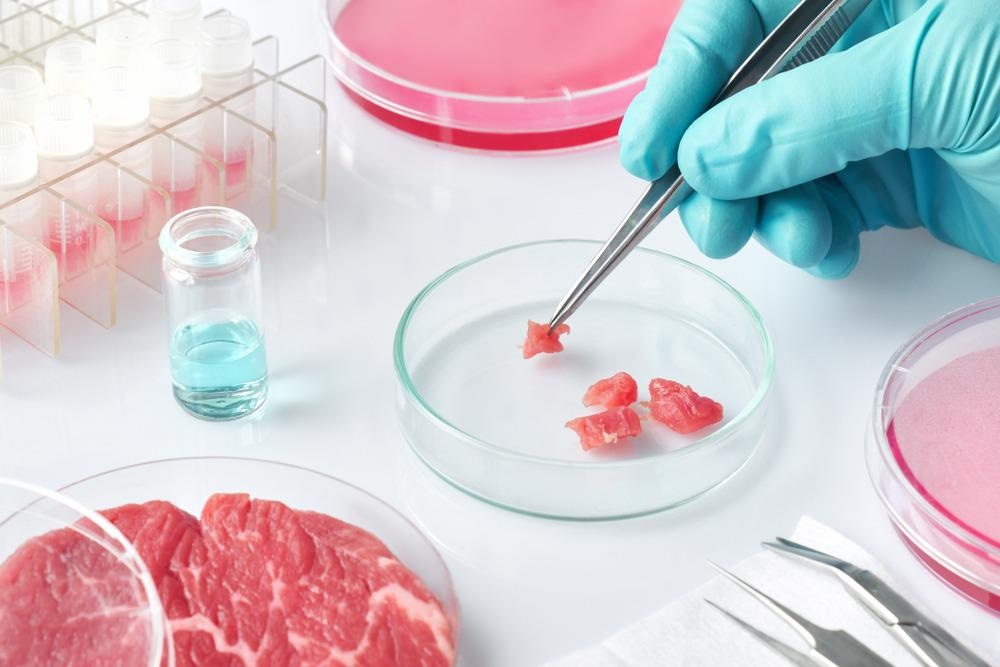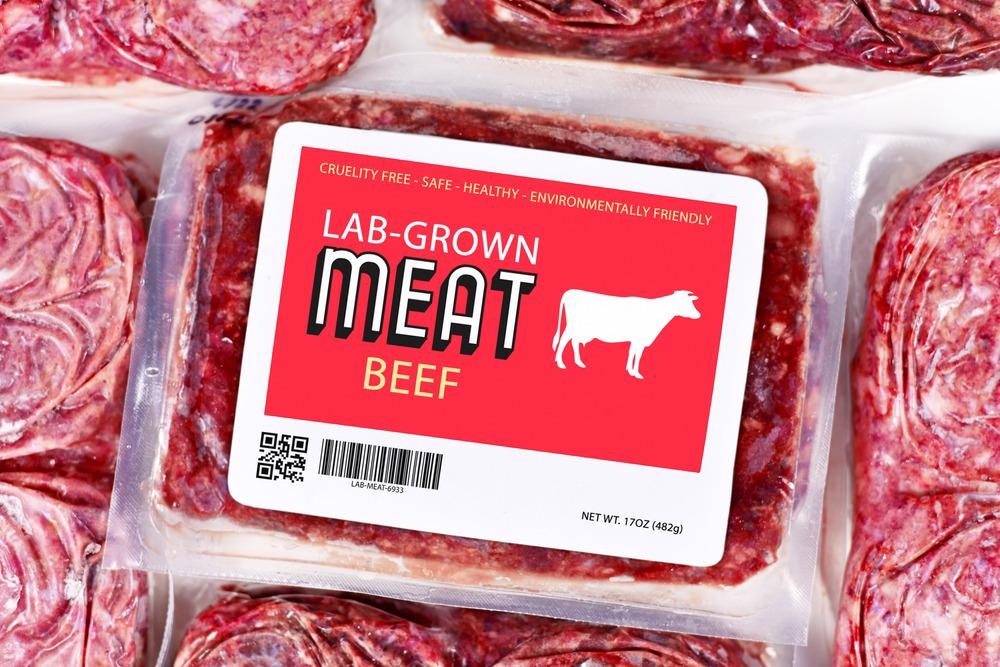Many environmentally conscious people consider that lab-grown meat can be an ethical alternative to conventional meat. It may solve multiple problems at once such as the food demands of the increasing population, helping the environment, and consuming cruelty-free meat. As it is cultured in labs, its fat content can also be modified making it more nutritional.

Lab-grown meat. Image Credit: tilialucida/Shutterstock.com
What is lab-grown meat?
Lab-grown meat is an alternative to conventional meat. It is cultivated in labs through the culture process, wherein a biopsy is taken from a live animal and stem cells are separated from the muscle cells. These stem cells are cultured in a medium that provides them with the nutrients needed for proliferation. The stem cells multiply and transform into muscle cells and fat cells, eventually forming meat.
Lab-grown meat is also called cultured meat, cell-based meat, artificial meat, cultivated meat, and designer meat.
Advantages and potential health benefits of lab-grown meat
The scope of lab-grown meat is wide and has the ability to address environmental concerns associated with conventional meat. Lab-grown meat consumes far less energy, land, and water. It is considered to be relatively cruelty-free and environmentally conscious.
Additionally, lab-grown meat is produced in a highly controlled environment which can protect the meat from microbes and contamination. E. coli, Salmonella, and Campylobacter are intestinal pathogens that cause illnesses every year and are a concern for meat-eaters. As there are no intestinal organs in the lab-grown meat, there can not be contamination during slaughter.
Lab-grown meat is also free from the growth hormones that are often injected into farm animals to make their meat better. This makes the Lab-grown meat healthier.
Another consequence the lab-grown meat evades is that of zoonotic diseases. Livestock grown in confined spaces are susceptible to outbreaks such as influenza. Lab-grown meat is safe from these zoonotic diseases plaguing the animals and the antibiotics that are given to them.
In addition to being antibiotic-free and safe from zoonotic diseases, lab-grown meat has immense health benefits. Scientists have suggested the possibility of altering the nutritional contents of cultured meat according to the necessary requirements. This type of meat is often called designer meat.
Furthermore, the type of fat can also be adjusted making it healthier than conventional meat. The fat content in the meat can be controlled by adjusting the growth medium. The amount of saturated fatty acids and polyunsaturated fatty acids can be modified as well.
Additionally, unhealthy fats in meat can be replaced with healthy and essential fats such as omega-3 fatty acids. Omega-3 fatty acids help reduce inflammation and the risk of heart diseases. Laboratory meat producers may also be able to add vitamins like B12 into the cultured meat. If scientists are able to produce meat in which macro and micronutrients can be altered according to the need of the human body, the potential health benefits of lab-grown meat are endless.
Disadvantages
One of the challenges that scientists are trying to overcome is the type of culture medium. The current medium being used contains Fetal Bovine Serum. This serum is obtained from the blood of a dead calf which is not only expensive but also contradicts the slaughter-free label of the lab-grown meat.
Additionally, researchers are yet to develop a true muscle with its organized blood vessels, connective tissues, and nerves. This makes it difficult for the lab-grown meat to provide the meat-eaters with the options of various cuts and animal muscles. The original taste and flavor of the conventional meat along with the diversity of animal species and breeds cannot be replicated in lab-grown meat yet.

Lab-grown meat. Image Credit: Firn/Shutterstock.com
Health concerns of lab-grown meat
Cultured meat is still a new product and its public health consequences are unknown. There is a possibility of cell lines dysregulation considering the exponential growth and multiplication of the cells. As it is not possible to control the culture process entirely some unwanted progression may take place.
One potential health concern that stands out is the cancer-promoting properties of cells that proliferate exponentially in vitro. Consuming lab-grown meat with such faulty cell lines may have unwarranted effects on the human body, the exact effects remain unknown.
Conclusion
Lab-grown meat has been hailed as the “Future Food” and for good reason. It is clean, green, and can be produced with fewer resources to feed the masses. It is free from zoonotic diseases and antibiotics. Theoretically, its nutrient profile can be controlled making it a healthy choice as well.
Meat technology is constantly making advances and is improving its efficiency and quality while addressing the social and cultural issues surrounding it. Although, the science behind lab-grown meat is complex and its long-term impact on human health should be carefully studied. The safety and health regulations for lab-grown meat should be established carefully keeping in mind environmental and consumer health.
References
- Bryant, C., (2020) Culture, meat, and cultured meat, Journal of Animal Science, Volume 98, Issue 8, skaa172, https://doi.org/10.1093/jas/skaa172
- Balasubramanian, B., et al. The Epic of In Vitro Meat Production—A Fiction into Reality. Foods 2021, 10, 1395. https://doi.org/10.3390/foods10061395
- Chriki, S. and Hocquette, J. (2020) The Myth of Cultured Meat: A Review. Front. Nutr. https://doi.org/10.3389/fnut.2020.00007
- Hanson, J., Ranney, J. (2020). Is Lab-Grown Meat Healthy and Safe to Consume?. Center for Food Safety. https://www.centerforfoodsafety.org/blog/6458/is-lab-grown-meat-healthy-and-safe-to-consume
Further Reading
Last Updated: Mar 21, 2022